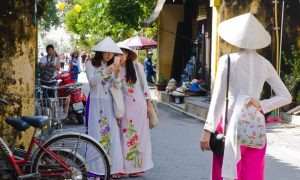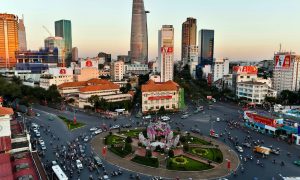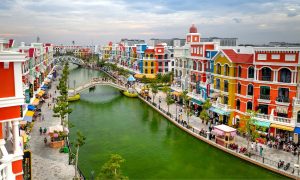In recent years, two Southeast Asian countries, Vietnam and Thailand, have attracted an increasing number of expatriates to settle and invest in the region due to their low cost of living, unique cultures, and fast-growing economies. Whether they are seeking a higher quality of life, looking for business opportunities, or wishing to spend their retirement in a tropical climate, theImmigration to Vietnamand Thailand both offer good options. However, both of these countries inimmigrantsEach has its own characteristics in terms of policies, living environment, and cultural differences, so which country is better for expatriates to settle in? This article will compare Vietnam and Thailand in a number of ways to help you make a more informed decision.
I. Comparison of immigration policies
Vietnam Immigrationdeal
Vietnam has a strict immigration policy, but in recent years, with the influx of foreign investment, the policy has been gradually relaxed. There are several ways for foreigners to settle in Vietnam:
-
work visa: For expatriates working in Vietnam, the most common type of visa is a work visa, which is usually valid for 1 year and can be renewed.
-
investment visa: Investors can obtain a long-term residence permit by setting up a business or investing in real estate. The investment amount usually needs to be at least 50,000 dollars.
-
Marriage Visa: Foreigners married to Vietnamese citizens can apply for long-term residence and enjoy treatment similar to that of their own citizens.
However, Vietnam does not yet offer applications for permanent residence or citizenship, and expatriates need to keep renewing the relevant visas if they want to stay for a long time.
Thailand Immigrationdeal
Thailand has a relatively liberal immigration policy that attracts a large number of expatriates and retirees. Expatriates can apply for residency in the following ways:
-
Retirement Visa (O-A Visa): Expatriates over 50 years of age can apply for a Retirement Visa, which requires a minimum deposit or proof of monthly income, which is usually 800,000 baht (about 22,000 RMB).
-
work visa: Expatriates can come to work in Thailand on a work visa, usually sponsored by an employer, but work visas are relatively difficult to obtain.
-
investment visa: Thailandinvestment immigrationPolicies are also more relaxed, with investors investing a certain amount of money in real estate or businesses in Thailand to obtain long-term residency.
-
permanent residence: Thailand offers permanent residence visas, which usually require residency in Thailand for more than 3 years and fulfillment of certain conditions, such as financial status, language proficiency, etc.
II. Cost of living comparison
Cost of Living in Vietnam
The cost of living in Vietnam is relatively low, especially in large cities such as Hanoi and Ho Chi Minh City. According to the International Cost of Living Index, consumption levels in Viet Nam are significantly lower than in Europe, the United States and some other countries in Southeast Asia.
-
stay at: Rents in Tier 1 cities are more moderate, for example, in Ho Chi Minh City, a 1-bedroom apartment can be rented for around US$200-500 per month, depending on location.
-
foodstuffs: Food consumption in Vietnam is relatively cheap, especially street food. Monthly expenditure on food is usually US$100-200.
-
transportation: Vietnam's public transportation system is relatively undeveloped, but cab and motorcycle rental services are convenient and inexpensive.
Overall, Vietnam is a great country for expats on a budget.
Cost of Living in Thailand
The cost of living in Thailand is relatively low, but the level of consumption is slightly higher compared to Vietnam, especially in major cities such as Bangkok.
-
stay at: A 1-bedroom apartment in the center of Bangkok rents for about $300-$800 per month, depending on location and amenities.

-
foodstuffs: Street food in Thailand is very cheap and daily food expenses are relatively low. Monthly food expenditures range from about 150-300 dollars.
-
transportation: Bangkok's public transportation system is relatively well developed and inexpensive. Cab and motorcycle rental services are reasonably priced.
Overall, the cost of living in Thailand is also relatively moderate for expats who are looking for a certain quality of life.
III. Cultural differences and social adaptation
Vietnamese Culture
Vietnamese culture is heavily influenced by Confucianism and has a strong sense of tradition, with respect for elders and family values prominent. Expats may need some time to adapt to the local social and work culture. Language is the biggest challenge; Vietnamese is relatively difficult for expats to learn, especially in daily communication, and Vietnamese generally use less English.
But as Vietnam's economy opens up, especially in major cities such as Ho Chi Minh City and Hanoi, more and more expatriates are integrating into local society.
Thai Culture
Thai culture is relatively more open and tolerant. Thais are known for their friendliness and hospitality, and expats can often integrate more easily into the local community. The social culture is relaxed and the working environment is also more relaxed.
The official language of Thailand is Thai, but English is relatively commonly spoken in Bangkok and tourist cities, which is a great advantage for expats.
In addition, Thailand's Buddhist culture plays an important part in daily life, and religious ceremonies and traditional festivals have become part of expatriates' understanding and integration into Thai culture.

IV. Comparison of health care
Vietnam Healthcare System
The standard of healthcare in Vietnam continues to improve, especially in major cities such as Ho Chi Minh City and Hanoi, where private hospitals and clinics provide better care. However, the quality of service in public hospitals can be more limited and expatriates tend to choose private healthcare facilities.
Overall, the cost of medical care in Vietnam is low, but for expatriates who require complex medical care, they may need to travel to neighboring countries such as Thailand or Singapore for medical care.
Thailand Healthcare System
Thailand has an excellent reputation for its healthcare system, especially in places like Bangkok and Chiang Mai, where many hospitals offer world-class medical care. Thailand has a comprehensive health insurance system and expatriates can choose to enroll in private health insurance to enjoy a higher standard of care.
Medical costs in Thailand are relatively inexpensive, especially for common illnesses and simple treatments, and are usually much lower than in Europe and the United States. Many expatriates even choose to travel to Thailand for medical tourism.
V. Conclusion: Which country is better for expatriates to settle in?
Whether you choose Vietnam or Thailand, both have their unique advantages and challenges.
-
If you focus on low-cost living and are willing to enjoy a peaceful daily life in a relatively simple living environment, Vietnam may be more suitable for you!The cost of living in Vietnam is low and the culture is relatively traditional. Vietnam has a low cost of living and a relatively traditional culture, so if you can adapt to the language and cultural differences, you will be able to live a very comfortable life.
-
If you are looking for better social benefits, higher quality healthcare and a more sociable environment, Thailand is a better choice!.. Thailand's relatively liberal immigration policy and open society make it easier for expats to integrate.
Ultimately, the choice of which country to settle in will need to be weighed against your personal needs, career plans, language skills and living habits. Whether it's Vietnam or Thailand, the lifestyle and unique culture of Southeast Asia can offer expats new experiences and opportunities.






